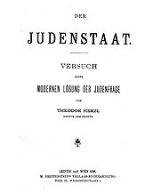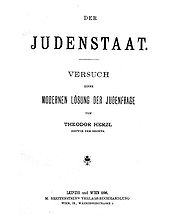
Der Judenstaat
Encyclopedia

Theodor Herzl
Theodor Herzl , born Benjamin Ze’ev Herzl was an Ashkenazi Jew Austro-Hungarian journalist and the father of modern political Zionism and in effect the State of Israel.-Early life:...
and published in 1896 in Leipzig
Leipzig
Leipzig Leipzig has always been a trade city, situated during the time of the Holy Roman Empire at the intersection of the Via Regia and Via Imperii, two important trade routes. At one time, Leipzig was one of the major European centres of learning and culture in fields such as music and publishing...
and Vienna
Vienna
Vienna is the capital and largest city of the Republic of Austria and one of the nine states of Austria. Vienna is Austria's primary city, with a population of about 1.723 million , and is by far the largest city in Austria, as well as its cultural, economic, and political centre...
by M. Breitenstein's Verlags-Buchhandlung. It is subtitled with "Versuch einer modernen Lösung der Judenfrage", "Proposal of a modern solution for the Jewish question", and originally called "Address to the Rothschilds" referring to the Rothschild family
Rothschild family
The Rothschild family , known as The House of Rothschild, or more simply as the Rothschilds, is a Jewish-German family that established European banking and finance houses starting in the late 18th century...
banking dynasty.
It is considered one of the most important texts of early Zionism
Zionism
Zionism is a Jewish political movement that, in its broadest sense, has supported the self-determination of the Jewish people in a sovereign Jewish national homeland. Since the establishment of the State of Israel, the Zionist movement continues primarily to advocate on behalf of the Jewish state...
. As expressed in this book, Herzl envisioned the founding of a future independent Jewish state
Jewish state
A homeland for the Jewish people was an idea that rose to the fore in the 19th century in the wake of growing anti-Semitism and Jewish assimilation. Jewish emancipation in Europe paved the way for two ideological solutions to the Jewish Question: cultural assimilation, as envisaged by Moses...
during the 20th century. He argued that the best way to avoid anti-Semitism in Europe was to create this independent Jewish state. Herzl, who had lived as a secular, largely assimilated
Cultural assimilation
Cultural assimilation is a socio-political response to demographic multi-ethnicity that supports or promotes the assimilation of ethnic minorities into the dominant culture. The term assimilation is often used with regard to immigrants and various ethnic groups who have settled in a new land. New...
Jew, was fluent in neither Hebrew nor Yiddish. His lack of contact with Jewish culture and intellectual currents, and his limited contact with Jews less assimilated than he prior to hitting upon the idea of a Jewish return to Zion, led him to imagine that popular Jewish support for a Jewish State elsewhere than in Palestine was conceivable.[needs citation] In Der Judenstaat, Herzl noted the possibility of a Jewish state in Argentina
Argentina
Argentina , officially the Argentine Republic , is the second largest country in South America by land area, after Brazil. It is constituted as a federation of 23 provinces and an autonomous city, Buenos Aires...
.
Herzl popularized the term "Zionism", which was coined by Nathan Birnbaum
Nathan Birnbaum
----Nathan Birnbaum was an Austrian writer and journalist, Jewish thinker and nationalist. His life had three main phases, representing a progression in his thinking: Zionist phase ; Jewish cultural autonomy phase which included the promotion of the Yiddish language; and religious phase...
. The nationalist movement culminated in the birth of the State of Israel in 1948, though Zionism continues to be connected with political support of the State of Israel.
Main argument
The main argument of the book is as follows. After centuries of various restrictions, hostilities, and occasional pogroms, the Jews of Europe have been reduced to living in Ghettos. The higher class is forced to deal with angry mobs and, so experiences a great deal of discomfort; the lower class lives in despair. Middle-class professionals are distrusted, and the statement "don't buy from Jews" causes much anxiety among Jewish people. It is reasonable to assume that the Jews will not be left in peace. Neither a change in the feelings of non-Jews nor a movement to merge into the surrounds of Europe offers much hope to the Jewish people. Jews "introduce" anti-Semitism wherever they go:- "The Jewish questionJewish QuestionThe Jewish question encompasses the issues and resolutions surrounding the historically unequal civil, legal and national statuses between minority Ashkenazi Jews and non-Jews, particularly in Europe. The first issues discussed and debated by societies, politicians and writers in western and...
persists wherever Jews live in appreciable numbers. Wherever it does not exist, it is brought in together with Jewish immigrants. We are naturally drawn into those places where we are not persecuted, and our appearance there gives rise to persecution. This is the case, and will inevitably be so, everywhere, even in highly civilised countries - see, for instance, France - so long as the Jewish question is not solved on the political level. The unfortunate Jews are now carrying the seeds of anti-Semitism into England; they have already introduced it into America."
The creation of a Jewish State may be a possible solution to the problem faced by Europe's Jews.
Herzl opposed the efforts already made by Zionist groups to settle Jews in Ottoman-controlled Palestine, arguing that "important experiments in colonization have been made, though on the mistaken principle of a gradual infiltration of Jews. An infiltration is bound to end badly. It continues till the inevitable moment when the native population feels itself threatened, and forces the government to stop a further influx of Jews. Immigration is consequently futile unless we have the sovereign right to continue such immigration.” (Quoted from The Jewish State, translated by Sylvie d’Avigdor, Nutt, London, 1896, and reprinted by Dover, 1988, p. 95.)
For this reason, Herzl, both in Der Judenstaat, and in his political activity on behalf of Zionism, concentrated his efforts on securing official legal sanction from the Ottoman authorities.
External links
- The Jewish State, A Century Later by Alan Dowty (1998)
- The Jewish State - Theodor Herzl's Program for Zionism
- German text on Wikisource

